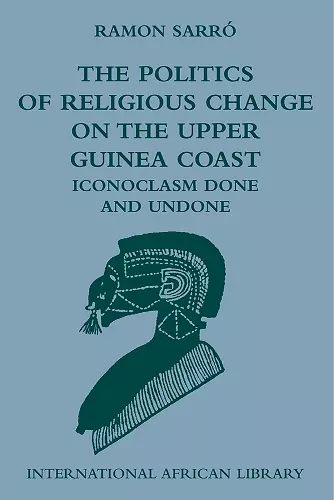The Politics of Religious Change on the Upper Guinea Coast
Iconoclasm Done and Undone
Format:Hardback
Publisher:Edinburgh University Press
Published:15th Dec '08
Currently unavailable, and unfortunately no date known when it will be back

The Politics of Religious Change on the Upper Guinea Coast offers an in-depth analysis of an iconoclastic religious movement initiated by a Muslim preacher among coastal Baga farmers in the French colonial period. With an ethnographic approach that listens as carefully to those who suffered iconoclastic violence as to those who wanted to 'get rid of custom', this work discusses the extent to which iconoclasm produces a rupture of religious knowledge and identity, and analyses its relevance in the making of modern nations and citizens. The book will appeal to a wide range of readers, particularly those with an interest in the anthropology of religion, iconoclasm, the history and anthropology of West Africa, or the politics of heritage. *This book examines the historical complexity of the interface between Islam, tradition religions and Christianity in west Africa, and how this interface links with dramatic political changes *It gives a detailed ethnographic approach through which such complex history is unveiled and analysed *It presents a dialogue between the field findings, a long tradition of anthropology and the most recent anthropological debates
A great strength of the monograph is Sarro's placement of the iconoclastic movement in an especially broad historical context, from precolonial times through 2007, which allows him to propose several reworkings of typical assumptions about historical ruptures and continuities! Sarro's close attention to how historical actors grappled with religious and political dilemmas, often in unexpected or non- transparent ways, makes his monograph unique, compelling to read, and broadly significant. -- Karin Smid, University ofTexas at Austin, Islamic Africa Under the successive mid-twentieth century urgings of Muslim iconoclasm and state socialism, it seems as if some coastal Baga of Guinea became willing accomplices in the destruction of their own revered customs, chiefly authorities, and material culture. The great achievement of Ramon Sarro's nuanced ethnography is to reveal the truth of this view of the past while simultaneously exploring its limitations, seen from contemporary Guinea in which Baga ethnicity and custom are re-emerging as contested territories. Beyond this specific instance, Sarro demonstrates why modernizing processes have been fractured, fractious and fracturing in the experience of African people. -- Richard Fardon This is a wonderfully subtle account of social change among the Baga-speaking people of coastal Guinea, centred on dance and iconoclasm as modes of religious and inter-generational contestation. Broad in scope, erudite, and yet elegant in presentation, Sarro's book has wide significance for debates about conflict as performance, while being a pleasure to read. -- Paul Richards Ramon Sarro's book on religious and political changes among the Baga of Guinea is a richly documented contribution to the anthropology of modernity... [His] historical ethnography attests to an impressive historical scholarship written with strong empathy... This book is a standing contribution to the historical and cultural knowledge of the Upper Guinea Coast and will be fully acknowledged by coming generations of regional scholars. -- CHRISTIAN HA JBJERG, Social Anthropology/Anthropologie Sociale A great strength of the monograph is Sarro's placement of the iconoclastic movement in an especially broad historical context, from precolonial times through 2007, which allows him to propose several reworkings of typical assumptions about historical ruptures and continuities! Sarro's close attention to how historical actors grappled with religious and political dilemmas, often in unexpected or non- transparent ways, makes his monograph unique, compelling to read, and broadly significant. Under the successive mid-twentieth century urgings of Muslim iconoclasm and state socialism, it seems as if some coastal Baga of Guinea became willing accomplices in the destruction of their own revered customs, chiefly authorities, and material culture. The great achievement of Ramon Sarro's nuanced ethnography is to reveal the truth of this view of the past while simultaneously exploring its limitations, seen from contemporary Guinea in which Baga ethnicity and custom are re-emerging as contested territories. Beyond this specific instance, Sarro demonstrates why modernizing processes have been fractured, fractious and fracturing in the experience of African people. This is a wonderfully subtle account of social change among the Baga-speaking people of coastal Guinea, centred on dance and iconoclasm as modes of religious and inter-generational contestation. Broad in scope, erudite, and yet elegant in presentation, Sarro's book has wide significance for debates about conflict as performance, while being a pleasure to read. Ramon Sarro's book on religious and political changes among the Baga of Guinea is a richly documented contribution to the anthropology of modernity... [His] historical ethnography attests to an impressive historical scholarship written with strong empathy... This book is a standing contribution to the historical and cultural knowledge of the Upper Guinea Coast and will be fully acknowledged by coming generations of regional scholars.
ISBN: 9780748635153
Dimensions: 234mm x 156mm x 19mm
Weight: 540g
264 pages